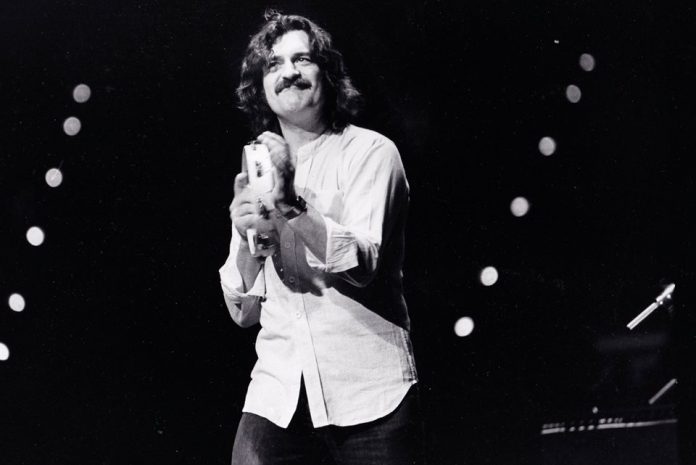HIT CHANNEL EXCLUSIVE INTERVIEW: July 2016. We had the great honour to talk with a legendary musician: Ray Thomas. He is best known as a founding member, flautist, singer and songwriter of the Moody Blues. He recorded backing vocals on “I Am the Walrus” and played harmonica on “The Fool on the Hill” by The Beatles. In the ‘70s he released two solo albums (“From Mighty Oaks” and “Hopes Wishes and Dreams”) in collaboration with Nicky James. Last year, Esoteric Recordings released the 50th Anniversary re-mastered edition of “The Magnificent Moodies” debut album of the Moody Blues. Read below the very interesting things he told us:
 Are you happy with the 50th Anniversary re-mastered edition of “The Magnificent Moodies” album?
Are you happy with the 50th Anniversary re-mastered edition of “The Magnificent Moodies” album?
To tell you the truth I haven’t already listened to it. I think it’s fine.
Why the first line-up of the Moody Blues didn’t last long?
Denny (ed: Laine –guitars, vocals) wanted to go solo and Clint (ed: Warwick –bass) didn’t want to go on the road anymore, because he had a family. So, that’s why it didn’t last so long.
When your new solo album will be released?
Oh, that’s the big question. I don’t know. Some tracks are finished, I suppose. I have to do some more recordings, a little of guitars…
In the ‘70s you recorded two solo albums with Nicky James. Was it a liberating experience to record those albums outside the Moody Blues?
It was great, absolutely great. Nicky James –he is dead now- and I, worked really well together. We had our own studio with the Moody Blues and Derek Varnals (ed: producer, engineer) was on our staff, and it was absolutely fabulous to have complete control of it.
When you finished the recordings of “Days of Future Passed” (1967) had you realised that you created a revolutionary album?
We were quite friendly with the guys from The Beatles. They came out with the “Sgt. Pepper’s” in our house and then when we finished “Days of Future Passed” we needed their advice and we played it to them and they were impressed too. I mean, “Sgt. Pepper’s” was a bit made itself, whereas “Days of Future Passed” I think was more of a concept album.
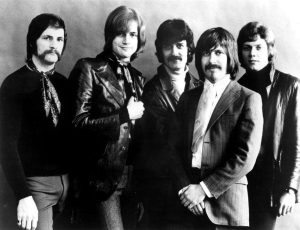 How important was the role of the producer Tony Clarke in the Moody Blues recordings?
How important was the role of the producer Tony Clarke in the Moody Blues recordings?
Oh, he was absolutely top-notch. Tony was putting his neck on the line with “Days of Future Passed”. He was staff producer for Decca and they wanted us and Peter Knight (ed: conductor, arranger) to do Dvorák’s “New World Symphony” and we turned it into “Days of Future Passed”. Decca didn’t know anything about it until it was finished. They had a meeting, they played it and they said: “Who’s gonna want to buy it?” Fortunately, a guy from the States was there, called Walt Maguire. He was the head of London Records, which was Decca America and he said: “If they don’t want it, I certainly do. This is going to blow up our sales in the States”. So, that’s how it got released.
What influenced you to write the great song “Legend of a Mind” (from the Moody Blues’ “In Search of the Lost Chord” album -1968)?
To be honest with you, it was a joke. I read a book by Timothy Leary and I saw the astral plane as the psychedelic colored biplanes that taking trips around the bay at seaside resorts. Back at the time, everybody was in spiritual things like the “Tibetan Book of the Dead” (ed: also Lennon’s influence on The Beatles’ song “Tomorrow Never Knows”) and after reading that, I said: “Timothy Leary’s dead / No, n-n-no he’s outside looking in”. And Tim liked it! I was quite good friends with Tim. He came to see us play at the Greek Theatre in Los Angeles and he came backstage after it and he said: “Can I have a word with you, Ray?”, so I said: “Yes”. He took me outside and he said: “If you tell anybody I said this, I will deny it”. He said: “That bloody song made me more famous than anything else that I did” (laughs). He was a really nice fella. He was just a mischievous Irishman. He was an anti-establishment guy.
You had some problems with a New York Times reporter when he died.
Oh, the thing was when Tim died everybody wanted to speak to me, you know (laughs). There was a woman from the New York Times and she said: “What drugs did you do with Tim Leary?” and I answered: “I never ever took any drugs with Tim and I never saw Tim take any drugs”. She insisted and wanted me to dig up some dirt. I had just lost a friend. I told her: “Fuck Off” (laughs)! Now, you can just laugh with it.
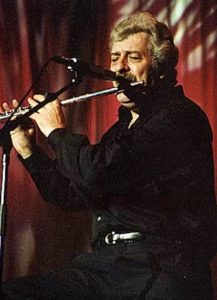 Do you have any memories of your performance at the Isle of Wight Festival in 1970?
Do you have any memories of your performance at the Isle of Wight Festival in 1970?
Oh, that was one of the biggest audiences I have played, probably the biggest audience we ever played. It was colossal. Viewing the audience from the stage was phenomenal. When they announced us, the warmth of the people was unbelievable. 600.000 people sent their laughing like a jumbo jet taking off. A long uproar, you know.
What is like to be probably the first rock ’n’ roll flautist?
My grandfather gave me a flute when I was a young man. I never took any lessons on flute myself. The thing was the flute blends beautifully with the strings and the stuff on the mellotron. Have you heard the Moody Bluegrass? They sent me a copy when they released their first album. We have been covered by everything from reggae to punk. I wasn’t really aware of them until I listened to it. I was so impressed with the incredible pickers from Nashville. I enjoyed the music, the songs and I sent them a note saying that I enjoyed it and I am really grateful for the great job they have done to our music. I sent: “The only one thing missing is my flute” and I sent them a little silver flute in a case. And when they did the second volume they told me: “We will do “Dear Diary”. Do you want to play the flute on it?” I said: “Sure” and they sent me the track and fortunately it was in the same key. So I played those two flutes on “Dear Diary”. I put those flutes on it and I sent it back and they sent me: “You are the first rock ‘n’ roll flute player. Now, you are the first bluegrass flute player” (laughs).
Is it flattering that Pete Townshend (The Who) is a huge fan of “On the Threshold of a Dream” (1969) album?
Yeah. I wasn’t aware of that. Oh, that’s great. I’m flattered.
Are you frustrated that the Moody Blues are not in the Rock and Roll Hall of Fame?
No, not at all. I mean, there are people in there that shouldn’t be in there. The thing was that going there, you authorize that. A lot of people think we should be in there.
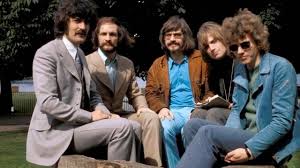 Did you feel comfortable when the Moody Blues backed Tom Jones in the song “It’s A Hung Up, Baby” on his TV show in 1969?
Did you feel comfortable when the Moody Blues backed Tom Jones in the song “It’s A Hung Up, Baby” on his TV show in 1969?
That was my idea. We wondered if Tom Jones suits in a band and we just did the guest singing with Tom. The thing is Tom has such a powerful voice –unbelievable- and we considered which way is gonna work. So, I simply said: “Why don’t we just be the backing band and do the backing vocals?”, which was great and that was what we did.
In 1983, Stevie Ray Vaughan opened 17 shows for the Moody Blues in North America. Do you remember that tour?
No I can’t, to be honest. The thing is I did a lot of tours and they all start to merge into one.
How did it happen to play on The Beatles’ songs “I Am the Walrus” and “The Fool on the Hill”?
Mike (ed: Pinder –keyboards, mellotron) and I –I said you that we were very friendly with The Beatles- went to the Abbey Road, the studio where they recorded and we did “The Fool on the Hill” and “I Am the Walrus”. And that was one of my suggestions to put the harmonicas on “The Fool on the Hill” because I played the harmonica as well as a young man. They had plenty of harmonicas –big bass ones, big long ones and so on. It was George (Harrison), John (Lennon), Mike and me, we all grabbed a harmonica and we did the (ed: mimics sound) “won-won-woon”. And it worked! Paul was on the desk in the control room. George Martin (ed: The Beatles producer) wasn’t there at the time.
Were you surprised when The Beatles played you the “Sgt. Pepper’s” album before its release?
Oh, we did! First of all, we heard “Rubber Soul” (1965) and they showed us the photograph from “Rubber Soul” when their photographer Bob Freeman printed it, and they said: “That’s what we are gonna use”. Brian Epstein (ed: The Beatles manager) managed us for a while too. He was a good man, a gentleman. There is nothing bad to say about Brian. The Beatles were always asking for our opinion, and we did the same with them. There was no backstabbing or anything like that in those days. We admired everything creative that was produced. They loved “Days of Future Passed” and we loved “Sgt. Pepper’s”, we loved “Tommy”. In those days, there was a lot of creativity.
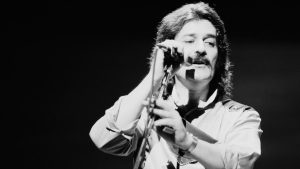 Did you get on well with Brian Epstein when he was the manager of The Moody Blues?
Did you get on well with Brian Epstein when he was the manager of The Moody Blues?
Oh yeah! Brian was ok. The thing was Brian was a gay and you weren’t supposed to be in those days. He was in a love with a bullfighter, a Spaniard matador and so he was spending less and less time managing groups and more and more time with his boyfriend. We had a contract with him at a time we needed to do more work. He gave us our contract back, he wished us good luck and there was no backstabbing. We wanted to leave and he could have kept us working for him. He was a gentleman for the whole thing. There is nothing negative to say for Brian.
Is it true that when you toured with The Beatles, John Lennon told you: “Look at me” and he played a completely different song on guitar?
(Laughs) That was on the last tour they did. They said: “This is ridiculous, we do lovely songs and nobody hears a word of it!” because there was a lot of screaming and John said: “Watch this”. The band was introduced, there was laughing and he played something completely different. And you couldn’t hear it! You couldn’t hear a goddamn thing!
Do you believe that popular music which was written in the ‘60s and ‘70s is much better than today’s music?
I think so. I think there was more creativity back then than there is now. One major thing I think is different now is that new bands don’t have any apprenticeship. We started to play in youth clubs, in pubs long before we went to theatres and if you don’t do it, you can’t learn it. There are bands that they put money into and it’s like throw away cigarette lighters. They throw them away, after they don’t bring any more money into. That’s why you have so many one hit wonders now.
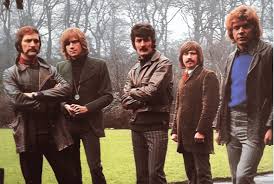 Had you ever met Jimi Hendrix?
Had you ever met Jimi Hendrix?
Oh, yeah. We met him when Chas Chandler brought him over from the States. Chas was the bass player with The Animals. We used to go to a club called The Scotch of St. James and Chas brought Jimi in there. Jimi Hendrix got on stage and everybody used to go in these places, it was all bands, singers and musicians who frequented clubs: Eric Clapton, Jimi Hendrix, half of the Stones, half The Beatles, Pete Townshend…
How emotional was to play again with John Lodge (Moody Blues –bass) on his last year’s album “10,000 Light Years Ago”?
It was John who called me and he said that he had written a song about his grandson (ed: “Simply Magic”) and asked me if I wanted to play some flutes on this song. That was alright. I have known John since I was 15 and he was 14. I haven’t worked with John for years, but when we went in the studio, it was just like we were in there yesterday. John was singing and was playing guitar. I played the bass flute and the C flute. John said it was fine. We did the whole thing in an afternoon. We had a great time. It was really, really pleasurable.
A huge “THANK YOU” to Mr Ray Thomas for his time and to Billy James and Lee Thomas for their valuable help.
Official Ray Thomas website: www.raythomas.me


